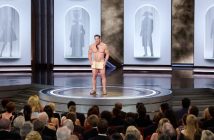Although it was an epoch-defining event, the lack of successful movies about the 2007-8 financial crisis tells you something about how hard it is to make an engaging, exciting film about complex financial instruments and credit ratings. JC Chandor’s Margin Call (2011) had a decent crack at it, packing it with talent like Kevin Spacey, Jeremy Irons, Demi Moore and Stanley Tucci, but that was still a stolid, if worthy affair. On the documentary side there’s Michael Moore’s Capitalism: A Love Story, which was as you’d expect, though nobody saw it. This adaptation of Michael Lewis’ book of the same name, from director Adam McKay (best known for Will Ferrell vehicles Anchorman, Talladega Nights and The Other Guys) is probably the best effort I’ve seen.
The film tells the story of real events, with a strong line-up of A-list talent playing the various market savants who saw the American housing market crash coming, and risked everything to bet against what had been the surest thing in finance – that somehow house prices always keep rising. Christian Bale plays awkward, twitchy hedge fund manager Michael Burry, clinging to the mast while clients and investors scream at him to change course; Steve Carell plays the angriest man on Wall Street, Mark Baum, who eventually decides to short subprime housing loans and watches while the investment banks collapse around him. Ryan Gosling is great as the young, ballsy trader who convinces Baum’s fund to gamble on it, and John Magaro and Finn Wittrock play two young investors looking to pull off their own big short from their shoebox operation.

My main concern having seen the trailer for The Big Short was that it looked a bit … wiggy. Steve Carrell and Ryan Gosling in particular have some serious hair going on and many a promising film has crashed upon the rocks of distracting hair and make-up (American Hustle, anyone?). That turns out not to be the case, because the film doesn’t take itself too seriously – there’s plenty of fourth-wall mischief from Gosling’s character, and when the momentum is threatened by the need to explain financial concepts like collateralised debt obligations, up pop sideshows like Margot Robbie in a bubble bath or Selena Gomez in a casino to enlighten us. It keeps it pacy, interesting, and – crucially – funny.
Brad Pitt’s Plan B production company landed the rights to this, having previously lost the bidding war for The Wolf of Wall Street to Leonardo DiCaprio and Warner Bros. Mr Pitt’s saviour complex seems to be alive and well: in 12 Years a Slave, also a Plan B production, Pitt gave himself the role of the Canadian labourer who risks his life to eventually liberate Solomon Northup; in The Big Short, a beardy Brad plays a retired trader who comes back from retirement to help the two young upstart investors, occasionally admonishing them for their lack of concern about getting rich off the suffering of Americans losing their homes. Another negative is that there are basically no women involved, except Baum’s wife, and a classy turn from Melissa Leo as a hapless ratings agency boss. Perhaps that all makes sense though – the financial crisis was, on the whole, a story about white men taking risks with other people’s money, and the film doesn’t pull any punches in exposing the clueless, insulated bubble in which the financiers operated, and in fact continue to operate.

Whether it’s worthy of the Best Picture Oscar nod it received is debatable (though if we’re nominating The Martian for Best Picture, then why the hell not?). What elevates it and makes it well worth a watch are the performances, particularly from Bale, Carrell and Gosling, and the perfect balance between irreverence, seriousness, drama and comedy. It won’t renew your faith in bankers, but it will definitely keep you entertained for a couple of hours.




